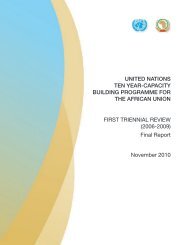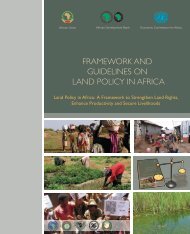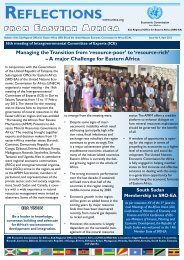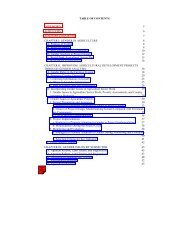A Decade of NEPAD - Economic Commission for Africa - uneca
A Decade of NEPAD - Economic Commission for Africa - uneca
A Decade of NEPAD - Economic Commission for Africa - uneca
You also want an ePaper? Increase the reach of your titles
YUMPU automatically turns print PDFs into web optimized ePapers that Google loves.
26 A <strong>Decade</strong> <strong>of</strong> <strong>NEPAD</strong>: Deepening <strong>Africa</strong>n Private Sector and Civil Society Ownership and Partnership<br />
Market <strong>for</strong> Eastern and Southern <strong>Africa</strong> (COMESA), the<br />
Community <strong>of</strong> Sahel and Saharan States (CEN-SAD), the<br />
East <strong>Africa</strong>n Community (EAC), the <strong>Economic</strong> Cooperation<br />
Organization (ECO), the Gulf Cooperation Council<br />
(GCC), the Intergovernmental Authority on Development<br />
(IGAD), the South Asian Association <strong>for</strong> Regional Cooperation<br />
(SAARC), the Southern <strong>Africa</strong>n Development<br />
Community (SADC), and West <strong>Africa</strong>n <strong>Economic</strong> and<br />
Monetary Union (WAEMU).<br />
In addition to inviting organizations from the host regions,<br />
invitations were extended to each region’s most important<br />
developed country partners, selected other relevant international<br />
institutions and representatives <strong>of</strong> the organizing<br />
countries <strong>of</strong> the original Bandung Asian-<strong>Africa</strong>n<br />
Conference <strong>of</strong> 1955. Thus, among the parties that joined<br />
the AASROC discussions as full participants, special participants,<br />
or observers, were representatives <strong>of</strong> Myanmar,<br />
China, and India; the <strong>Africa</strong>n Union; the Arab League;<br />
the G-77; the Secretariat <strong>of</strong> <strong>NEPAD</strong>, the Non-aligned<br />
Movement; the Secretariat-General <strong>of</strong> the United Nations<br />
and the relevant United Nations Bodies, namely the ES-<br />
CAP, the United Nations Development Programme, the<br />
United Nations Conference on Trade and Development,<br />
the United Nations Industrial Development Organization,<br />
the UN Office <strong>of</strong> the Special Coordinator <strong>for</strong> <strong>Africa</strong> and<br />
the Least Developed Countries (UN-OSCAL), the World<br />
Bank, and the International Monetary Fund (IMF); the<br />
Islamic Development Bank (ISDB); the Asian Development<br />
Bank (ADB), the <strong>Africa</strong>n Development Bank; the Global<br />
Coalition <strong>for</strong> <strong>Africa</strong>; the European Union; and the Pacific<br />
Islands Forum (PIF) Secretariat.<br />
Furthermore, key donor countries that were represented at<br />
the Conference included: the United States <strong>of</strong> America, the<br />
People’s Republic <strong>of</strong> China, Japan, the Republic <strong>of</strong> Korea,<br />
the Russian Federation, the Federal Republic <strong>of</strong> Germany,<br />
the United Kingdom, France, the Kingdom <strong>of</strong> Saudi Arabia,<br />
Canada, and Switzerland. Overall, from July 29-30, 2003<br />
delegates from 22 sub-regional international organizations<br />
representing 36 countries gathered in Bandung, Indonesia<br />
<strong>for</strong> the inaugural ASSROC meeting.<br />
As an inaugural gathering the conference discussion focused<br />
in large part on stock-taking: 1) <strong>of</strong> the current global<br />
environment; 2) <strong>of</strong> the status <strong>of</strong> Asia-<strong>Africa</strong> linkages and<br />
recent initiatives that have been undertaken to improve<br />
them – noting TICAD, the Sino-<strong>Africa</strong> process and India-<br />
<strong>Africa</strong> Fund to support <strong>NEPAD</strong>; 3) <strong>of</strong> the need to accelerate<br />
activities in both regions toward the achievement <strong>of</strong> the<br />
Millennium Development Goals; 4) <strong>of</strong> prospective areas<br />
<strong>of</strong> collaboration which could be pursued after the <strong>for</strong>um<br />
(including focus on areas such as health, education and<br />
training, in<strong>for</strong>mation and communications technologies,<br />
agriculture, infrastructure development, transportation,<br />
trade, finance, good governance, civil society, private sector<br />
development, peace and security, and conflict resolution);<br />
and 5) <strong>of</strong> what principles should underpin a “New Strategic<br />
Partnership” between Asia and <strong>Africa</strong>.<br />
From August 19-20, 2004, the second meeting <strong>of</strong> AASROC,<br />
“AASROC II”, was held in Durban, South <strong>Africa</strong> to provide<br />
a <strong>for</strong>um <strong>for</strong> reporting on the many deliberations which<br />
took place in Bandung. The hallmark <strong>of</strong> the AASROC<br />
initiatives were reiterated and included:<br />
ӹ A commitment to follow a gradual and orderly process;<br />
ӹ A focus on the attainment <strong>of</strong> practical results;<br />
ӹ A commitment to activity and policy <strong>of</strong> mutual benefit;<br />
and<br />
ӹ A commitment to seeking win-win results <strong>for</strong> all.<br />
Observing that plans were already underway to have an<br />
unveiling <strong>of</strong> the Asian – <strong>Africa</strong>n New Strategic Partnership<br />
at a planned commemorative Golden Jubilee <strong>of</strong> the<br />
inaugural Asian-<strong>Africa</strong>n Conference <strong>of</strong> 1955 in Indonesia<br />
in 2005, the delegates agreed to abide by the abovementioned<br />
principles to:<br />
ӹ Guide the institutional building <strong>of</strong> AASROC and the<br />
establishment <strong>of</strong> the New Strategic Partnership in the<br />
spirit <strong>of</strong> “solidarity, equality and cooperation” advocated<br />
in the first “Bandung Conference”;<br />
ӹ Respect diversity among civilizations and the right <strong>of</strong><br />
all countries to choose their own roads to development<br />
independently, and to jointly promote multilateralism<br />
and more democratized international relations;<br />
ӹ Increase exchanges and mutual learning in order to<br />
share each other’s development experience and achievements<br />
and promote all-directional cooperation, with a<br />
special emphasis on incorporating existing cooperation<br />
between countries and regional organizations as key ingredients<br />
<strong>of</strong> the Asian-<strong>Africa</strong>n cooperation framework;<br />
ӹ Expand exchanges at various levels to enhance mutual<br />
understanding and friendship between Asian and <strong>Africa</strong>n<br />
peoples;<br />
ӹ Strengthen consultation and coordination in regional<br />
and international affairs to jointly safeguard the







